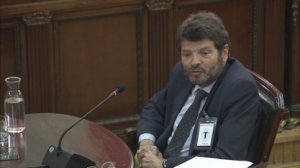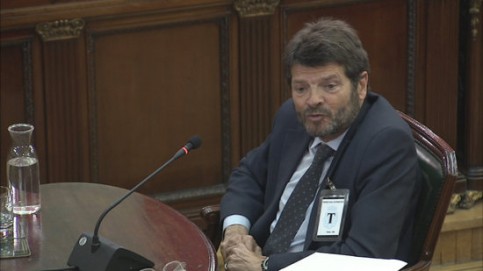On day 35 of the Catalan trial, the former director general of the Catalan police (the Mossos d’Esquadra) told the Supreme Court on Wednesday that he resigned his post in July 2017 as he was ‘not comfortable’ with how political events were ‘unfolding’ in the run-up to the independence referendum on 1 October.
Catalan Trial: click here full details of those accused, the charges, and the accusers.
Testifying in the trial of the Catalan leaders charged with organising the independence bid, Albert Batlle added that he decided to resign after Joaquim Forn – who is one of the defendants – was appointed interior minister.
Despite his misgivings about the government’s intentions, Batlle insisted that the Catalan police always abided by the law and judicial rulings, and when he left his post he predicted that they would continue to do so.
He also said that Catalan police chief Josep Lluís Trapero – who is charged with rebellion in a related case – was very ‘protective’ of the police’s powers and ‘would not have accepted any interference from politicians’.
Also testifying on Wednesday was Joan Ignasi Elena, the former coordinator of the National Pact for the Referendum (PNR), who assured the court that the organisation received no public money and that its website was not managed by the Catalan government.
ALSO READ: Jordi Sànchez: ‘Nothing we’ve seen in our trial justifies prison’
According to Elena, the PNR – an umbrella body that included organisations and individuals in favour of a self-determination referendum – was funded by private donations and that the Catalan government was just one of thousands of entities that joined.

Earlier in the day, a manager of the Unipost postal service, Rafael Ramírez, admitted that employees ‘assumed’ that the company had been hired to distribute material related to the independence referendum, but that they did not know for sure.
ALSO READ: Junqueras: ‘I consider myself a political prisoner’
Unipost’s chairman, Antón Raventós, also testified, denying knowledge of referendum-related invoices sent to the government, while the former financial director, Xavier Barragan, said the firm received no payments for such work from the government.
Jordi Solé, a member of the European Parliament for pro-independence Esquerra Republicana (ERC) party, recalled the protests against Spanish police raids in the run-up to the 2017 referendum.
‘It was not a tense situation,’ said Solé. ‘I saw neither any attacks nor threats.’
Catalan Trial: click here full details of those accused, the charges, and the accusers.
Click here for all articles and updates on the Catalan Trial
ALSO READ: Catalan Trial: Day 34 summary
ALSO READ: Catalan Trial: Day 33 summary
ALSO READ: Catalan Trial: Day 32 summary
ALSO READ: Catalan Trial: Day 31 summary
ALSO READ: Catalan Trial: Day 30 summary
ALSO READ: Catalan Trial: Day 29 summary
ALSO READ: Catalan Trial: Day 28 summary
ALSO READ: Catalan Trial: Day 27 summary
ALSO READ: Catalan Trial: Day 26 summary
ALSO READ: Catalan Trial: Day 25 summary
ALSO READ: Catalan Trial: Day 24 summary
ALSO READ: Catalan Trial: Day 23 summary
ALSO READ: Catalan Trial: Day 22 summary
ALSO READ: Catalan Trial: Day 21 summary
ALSO READ: Catalan Trial: Day 20 summary
ALSO READ: Catalan Trial: Day 19 summary
ALSO READ: Catalan Trial: Day 18 summary
ALSO READ: Catalan Trial: Day 17 summary
ALSO READ: Catalan Trial: Day 16 summary
ALSO READ: Catalan Trial: Day 15 summary
ALSO READ: Catalan Trial: Day 14 summary
ALSO READ: Catalan Trial: Day 13 summary
ALSO READ: Catalan Trial: Day 12 summary
ALSO READ: Catalan Trial: Day 11 summary
ALSO READ: Catalan Trial: Day 10 summary
ALSO READ: Catalan Trial: Day 9 summary
ALSO READ: Catalan Trial: Day 8 summary
ALSO READ: Catalan Trial: Day 7 summary
ALSO READ: Catalan Trial: Day 6 summary
ALSO READ: Catalan Trial: Day 5 summary
ALSO READ: Catalan Trial: Day 4 summary
ALSO READ: Catalan Trial: Day 3 summary
ALSO READ: Catalan Trial: Day 2 summary
ALSO READ: Catalan Trial: Day 1 summary


